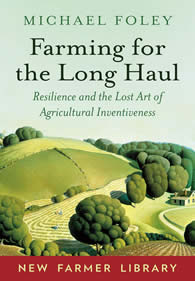Book Review:
Author Michael Foley lives and farms here in Willits, CA, a well-known local who operates Green Uprising Farm in the valley. Several reviews of this book make mention of Wendell Berry's The Unsettling of America, and in fact it is almost impossible not to. If that tome changed your life like it did for so many of us, Farming for the Long Haul will speak to you deeply. Indeed, Foley makes seemingly infinite references to Berry, and the whole piece of ensuing writing feels like a companion to Unsettling. The sad fact is that since Berry's groundbreaking book was published in the 1970s, everything it spoke out about has gotten more perilous, and technology and social trends have created whole new issues then unseen. In Farming for the Long Haul, Foley points out several times that farming is not a job, it is a vocation. Farming is a calling, a spiritual quest and awakening, and a meditation on the soil, water, air, and all of life. At the same time, farming is an economic endeavor, and if a farmer is going to be successful in keeping his vocation and his family's home, then he is going to have to pay just as much attention to the financial side of things as the spiritual. Foley notes that farmers are price takers, not price makers, and that the best chance they have of increasing net income on a small farm is by maximizing production efficiency, especially by doing as much as they can themselves, with their own resources, or through cooperatives. Farmers, he illustrates again and again, are tough and inventive people, truly resilient stock. Without these traits a farmer won't survive—without these traits a farmer never has. This is not a particularly uplifting book, but it is enormously factual and begins a lot of internal conversations about one's personal consumption habits and production practices. Foley's writing is the result of decades of observations of society and how we procure our food, as well as deep study of the land itself, and it bears the marks of both inquests. If there is a positive message to be found here, it's the idea that small-scale agriculture is not going away; as large-scale agribusiness fails and our current food system collapses, small producers will continue growing melons and corn, slaughtering hogs, and feeding their neighbors as they have through time. Also, if you yourself happen to be a farmer, this book is an immense source of pride. Although it may have a distressing message behind it, it is impossible to come away without feeling extremely validated that what we are doing is the righteous thing to do. And that, in its own way, is an incredibly positive message. Highly recommended reading.
top | Newsletter Home |Table of Contents| Archive
|


 At Ecology Action, we read a lot of books, especially books about plants, farming, alternative economic systems, power structures, self-reliance, self-governance, and self-improvement— essentially, we read a lot of radical books. And
At Ecology Action, we read a lot of books, especially books about plants, farming, alternative economic systems, power structures, self-reliance, self-governance, and self-improvement— essentially, we read a lot of radical books. And 